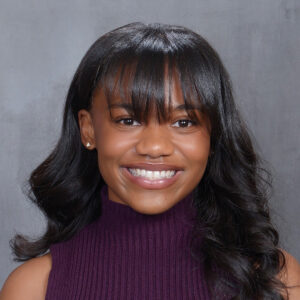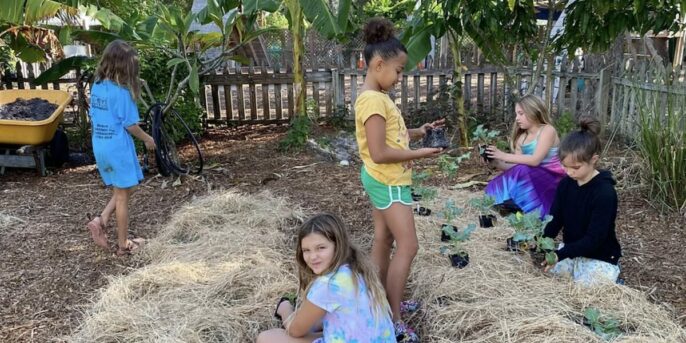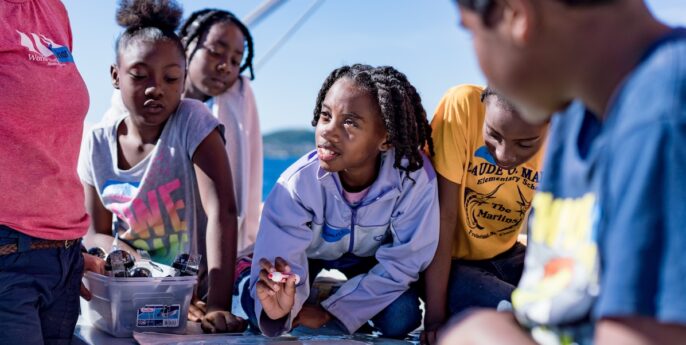I recently spent the day at Village High School, where I had the chance to meet with both learners and teachers to dive deep into their experiences. I sat down with students who shared how they take ownership of their education, as well as with educators and mentors who explained the intentional approach they use to guide and empower these students. Through these conversations, it became clear that Village High’s unique blend of personalized mentorship, flexible learning structures, and real-world experiences creates an environment where students feel supported, valued, and fully engaged in their learning journey.
Mentorship: The Heart of Village High
Mentorship at Village High School is at the heart of a relationship-first culture, giving every learner a trusted advocate who supports their growth and well-being.
Tessa Calvert (Educator): “Our mentor program is a cornerstone of Village High School. Every student in the building has a chosen mentor. It’s not just about academics—it’s about building trust and relationships.”
Courtney Bushnell (Educator): “The fact that students get to choose their mentors is huge. Giving students the power to decide who they connect with makes the relationship more meaningful.”
Susan Nolan (Educator): “In traditional schools, there are many students who don’t have a trusted adult looking out for them. Our mentorship model ensures that every student has at least one adult they can turn to—someone who is actively looking out for them, advocating for them, and helping them navigate challenges.”
Jay McBride (Educator): “Our approach isn’t just about mentorship—it’s about shifting the entire school culture to be relationship-first. When relationships come first, everything else—academic growth and personal development—naturally follows.”
How Students Experience Mentorship
Village High’s mentorship program empowers students to build supportive, personalized relationships that fit their unique needs and goals.
Emily (Learner): “I picked my mentor in freshman year and have stuck with her ever since. She’s great at balancing trust and accountability—if I’m behind, she’ll check in and help me make a plan to catch up.”
Mackenzie (Learner): “As a transfer student, having a mentor helped me feel more comfortable. She advocates for me, answers all my questions, and even if she doesn’t know something, she’ll find someone who does.”
Garreg (Learner): “My mentor is pretty hands-off, which is what I wanted. She lets me do my thing, but she’s there if I need her.”
Aspen (Learner): “My mentor is hands-on when necessary but lets me work independently most of the time. I mostly use my mentor as someone to talk to, and she’s super supportive.”
Building a Connected Culture
At Village High, the focus on relationships extends beyond mentorship. The school’s open environment and intentional community-building efforts foster a culture where students feel seen, heard, and valued.
Courtney Bushnell (Educator): “We approach education with relationships first. Regardless of whether a student is officially our mentee or not, we work to create a supportive environment.”
Susan Nolan (Educator): “The physical design of our school plays a big role. We have an open space that encourages interaction, helping students and staff naturally build relationships.”
Jay McBride (Educator): “There’s no ‘kids vs. adults’ mentality here. Students see us as allies, not authority figures.”
Student Perspectives on Community and Connection
Village High fosters a community built on trust, respect, and meaningful connections between young people and mentors.
Mackenzie (Learner): “The biggest thing? There’s trust between students and teachers. If you don’t show up for an in-person class, there aren’t harsh consequences, but there is accountability.”
Emily (Learner): “The teachers care about us as people, not just as students. The relationship is based on mutual respect.”
Aspen (Learner): “Flexibility is everything. You can structure school around your life. If you have a job, sports, or other commitments, you can create a schedule that actually works for you.”
Our approach isn’t just about mentorship—it’s about shifting the entire school culture to be relationship-first. When relationships come first, everything else—academic growth and personal development—naturally follows.
Jay McBride
A Flexible, Learner-Centered Model
Village High’s approach is built on flexibility and self-directed learning, allowing students to take ownership of their education while pursuing passions outside of the classroom. Sitting with the students at Village High, I saw firsthand how they took charge of their learning. As they shared their experiences, it was clear they had a strong sense of ownership over their education. But beyond the conversation, I got to see them in action. Throughout the day, they moved between projects, discussions, and hands-on work, shaping their learning in real time. It was a direct look at how their education adapted to their needs and interests.
Susan Nolan (Educator): “Students are responsible for managing their schedules, just like they would in a real job. We help them develop the self-regulation skills they need to be independent and successful.”
Jay McBride (Educator): “Students progress at their own pace through online learning in their core subjects. This frees up time for electives and personal interests.”
Courtney Bushnell (Educator): “We have many competitive athletes, performers, and students with other passions outside of school. The flexibility we offer means they can travel, compete, or perform without falling behind academically.”
How Students Navigate Flexibility and Ownership
At Village High, learners take ownership of their education through flexible schedules that adapt to their unique needs and interests.
Garreg (Learner): “My first class starts at 11 a.m., and then I leave by 12:45 p.m. to head to Denver for hockey practice. Since my schedule is designed around my training, I do most of my schoolwork at home.”
Mackenzie (Learner): “I intentionally didn’t schedule a first-period class because I hate waking up early. Everyone’s schedule is unique, and you’re not forced into a rigid structure.”
Aspen (Learner): “My schedule is different every day because I travel a lot with my family. And if you ever need to adjust your schedule for any reason, you can. It’s not a one-size-fits-all system.”
Real-World Opportunities and Community Connections
Village High connects learners with real-world experiences, enabling them to engage with the community and explore career paths.
Jay McBride (Educator): “We’ve had students participate in amazing internship opportunities, including paid placements with engineering firms and other local industries.”
Courtney Bushnell (Educator): “We have strong community partnerships. Professionals from various industries visit our school to speak with students about their careers and life experiences.”
Susan Nolan (Educator): “Our civics class attended a naturalization ceremony in Denver, giving them a firsthand look at what it means to become a U.S. citizen.”
Pursuing Passions Beyond the Classroom
Young people shape their learning journey based on their own passions with unwavering support and encouragement from mentors.
Garreg (Learner): “For me, it’s hockey—everything revolves around that. My schedule is built around my training, and the school fully supports that.”
Emily (Learner): “I love traveling and learning about different cultures. My goal is to get a degree in international relations, and the school made it happen. They listen to us.”
Aspen (Learner): “I’m into speech, debate, and theater, and we now have those classes here too. If there’s something you’re passionate about, chances are Village will find a way to support it.”
Mackenzie (Learner): “I’m passionate about humanitarian work, and Village lets me bring those ideas to life. We’re partnering with Make-A-Wish because I wanted to do more service-based work.”
Final Thoughts
Susan Nolan (Educator): “One of the most rewarding aspects of our approach is that we don’t just mentor students—we often mentor parents, too. That shift allows families to have healthier dynamics at home.”
Jay McBride (Educator): “Ultimately, our goal is to create self-directed learners who take ownership of their education. By treating students like adults and giving them real responsibility, we’re setting them up for success not just in school, but in life.”
Visiting Village High School, I saw firsthand how a learner-centered approach transforms education. From students choosing their mentors to creating flexible schedules that fit their lives, every aspect of the school is built around trust, relationships, and real-world learning.




